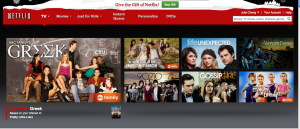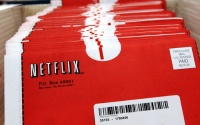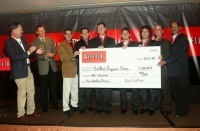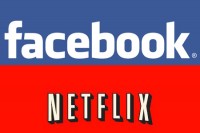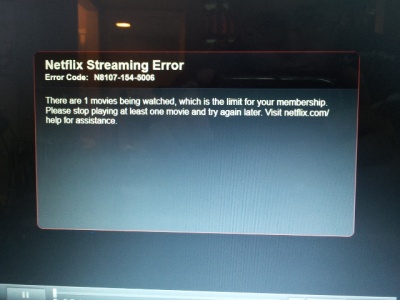Netflix
|
Netflix, Inc. is an American online movie rental and video streaming service that offers a flat-fee subscription plan for DVD and Blu-ray disc rentals, as well as online streaming. Netflix was founded on August 29, 1997 in Scotts Valley, California by Reed Hastings and Marc Randolph.[1][2]The Netflix business model is built on flat-fee unlimited rentals without due dates, late fees, shipping and handling fees, or per title rental fees. Netflix has grown to more than 30 million streaming members across the United States, Canada, Latin America, the United Kingdom, and Ireland.[1] Ethical issues such as monopolization, the influence of recommendations, sharing and piracy are several concerns involving this movie rental company.
Contents
History
Reed Hastings and Marc Randolph had previously worked together at Pure Software, a company that provided Purify, a debugging tool for Unix/C engineers. Netflix started when Hastings was charged a late fee when returning a DVD after its due date.
After the business model was established the company opened for business on April 14th, 1998. Netflix started with a catalog of 925 DVDs for rent which was almost as many as there were in existence during the time. They originally offered a seven day rental service for four dollars in addition to the shipping cost which was two dollars at the time, the cost would go down once additional DVDs were ordered.[3]
In July 2011, Netflix announced a new pricing model which split online streaming and DVD rental into two separate categories. Previously, unlimited streaming and DVD rental was offered as a packaged deal for $9.99 per month. The new model prices unlimited online streaming at $7.99 per month and unlimited one-at-a-time DVD rental at $7.99 per month. Subscribers who wished to maintain both streaming and DVD rentals would have to pay $15.98 per month[4], which would be a 60% price increase.
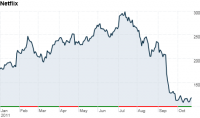
The new price model was a result of Netflix attempting to put their DVD rental services under the name Qwikster. This required customers to access a different website with a different account and password in order to rent DVDs. Qwikster would offer a new feature, the ability to rent video games, which was previously not available from Netflix. However, due to negative feedback from customers, Netflix CEO Reed Hastings announced that the DVD-by-mail service would remain a part of Netflix, rather than becoming a separate entity.[2]
While the Qwikster plan fell through, Netflix still maintained the new pricing model. Between July and October 2011, Netflix lost around 800,000 subscribers, and Netflix stock dropped nearly 50%. [6] Hastings responded to the drop stating, "We didn’t give it enough thought. We didn’t give it enough explanation, enough integration, and you know, that’s legitimately caused our customers to be angry.”[6]
Services
Netflix subscribers are able to watch unlimited movies and TV episodes for a monthly flat-rate. Users can choose to opt-in to renting unlimited DVDs by mail for an additional monthly fee. In 2011, Netflix split its service pricing such that customers must decide whether to pay for online streaming, mail order DVD rentals, or both. In a 2011 report by Sandvine, Netflix is the biggest source of North American web traffic, accounting for 24.71% of the total traffic.[7]
Online Streaming
Netflix has a "Watch Instantly" feature that allows thousands of movies and TV shows to be instantly streamed to your TV via a PS3, Wii, Xbox 360, or any device that allows streaming. Films can be paused and restarted at will. Netflix's content library is encoded into three bandwidth levels. The lowest tier requires a continuous downstream bandwidth of 1.5 Mbit/s, with stereo audio and video quality comparable to that of a DVD. The second tier requires 3 Mbit/s and offers "better than DVD quality." The highest tier requires 5Mbit/s and offers 720p HD with surround sound audio. Several devices such has the PlayStation3 and Roku 2 can stream Netflix content at 1080p, but it is unclear what 1080 content, if any, is delivered.[8]
DVD Rental
For an additional monthly fee, Netflix users can add the "1 DVD out-at-a-time" plan to their subscription. Once subscribed, the user can create a list of desired movies or programs. Netflix mails the first 1-3 titles on the list, depending on the service desired, and as the client returns the movies in a prepaid envelope, subsequent titles are mailed in order. Customers with a good return record can upgrade plans to up to 8 discs at a time. Blu-ray discs are also available for an additional cost. In an attempt to help studios sell more physical media at retail outlets, Netflix reached an agreement with Warner Brothers Pictures, Universal Studios, and Twentieth Century Fox to delay renting new releases for 28 days from their retail release.[9]
Free Trial and Cancellation
New clients of Netflix can qualify for a 1 month free offer all that is needed is a valid email and credit card number that has not been attached to a Netflix account before. If the subscription is cancelled within the month, no charges will be charged. However, if membership is not removed within one month, the regular monthly fee will be charged. Subscriptions can be cancelled at anytime online with no termination fee. There is no refunds or credits for partial months.
"Netflix Prize"
The Netflix Prize was launched in 2006 as an open competition to substantially improve the accuracy of user ratings for films. The competition was open to anybody who was not connected to Netflix (current and former employees, agents, close relatives of Netflix employees, etc.) or a resident of Cuba, Iran, Syria, North Korea, Myanmar, or Sudan. Prizes were based on improvement over Cinematch, Netflix's own algorithm. If no team won the grand prize, a progress prize of $50,000 was awarded each year to the team with the best result thus far, given that the algorithm improved the root mean squared error (RMSE) on the quiz set by at least 1% over the previous progress prize winner. A team could attempt as many submissions as they wished. Submissions could be made once a day where the team's best submission so far counted as their current submission. If a team managed to improve the RMSE more than 10%, the jury would allow all teams 30 days to send in their last submissions. Then, the team with the best submission was asked for their algorithm description, source code, and non-exclusive license. And finally, after a successful verification, a grand prize winner is chosen. On September 21, 2009, the grand prize of $1,000,000 was rewarded to BellKor's Pragmatic Chaos team which beat Netflix's own algorithm for predicting ratings by 10.06%.[10]
Ethical Issues
Monopolization
In 2006 Netflix patented the "mail me" video rental system, completely shutting out previous home rental giants like Blockbuster from any business. Netflix revolutionized the way movies and TV shows are watched through their streaming and mailing services, but the patent system was created in order to encourage innovation, not necessarily to put other company's out of business. Blockbuster filed for bankruptcy on September 23, 2010, and was eventually bought out by Dish Network. Without any competitors Netflix could very well set their their current $15 a month service price higher and higher as they corner the market. [1]
Recommendation Algorithm
Netflix uses hybrid Recommender Systems to suggest and display movies to its users. This system is based on user ratings, user-to-user similarities in ratings, as well as a learning algorithm that learns patterns in user history in order to recommend in an accurate and optimal manner. [11] Use of a recommender system that is not singularly based on ratings is ethically concerning not only because of data collection as a privacy risk but also because users of Netflix may choose to watch movies with friends and then receive recommendations based on personal preferences users do not wish to share publicly. The recommender system that is in place currently also faces the ethical issue of allowing other users of the Netflix account to influence the recommendations displayed for the owner of the account.
Pairing with Facebook
In 2011, Netflix integrated its video streaming service with Facebook in 44 countries. This new pairing allows users to watch videos on either site and to see what people on their friends lists are viewing. The 1988 Video Privacy Protection Act came about after a D.C. area video store gave a Washington City Paper reporter the rental records of U.S. District Judge Robert Bork., causing his nomination to the Supreme Court being rejected by the Senate. It prohibits the disclosure of video sales or rental records.[12] Michael Drobac, the government affairs director of Netflix, urged users to write in support of an amendment that would allow Netflix to get user information and share it through the Internet. Later that year, the House of Representatives passed HR 2471, a bill that amends VPPA.[12] Consumers now have the choice to decide whether or not Netflix can access and share their rental history.[13] On November 29, 2012 the Senate Judiciary Committee unanimously voted to pass an amendment that would force law enforcement to attain a warrant in order to read emails, Facebook messages, and other electronic communications. The next step in the legislative process will bring HR 2471 to a vote in the senate. If passed, Facebook users will be able to automatically share the movies they have watched on Netflix to their Facebook newsfeeds once they install the Netflix app.[14]
Sharing
Previously, many people gained access to Netflix without paying for its services. Multiple users accessed accounts of family members or friends, where one person subscribed to the service and others "piggybacked" on the account. With a simple login email address and password, Netflix was easily shared beyond the account subscriber. Experiencing the trend of shared accounts, Netflix implemented a strict limit on the number of concurrent streams on different devices in 2011. Unless users subscribed to more expensive premium accounts, they were now unable to stream Netflix concurrently on more than two different devices. [15]
"Throttling"
Another issue within the Netflix community is called "throttling". Throttling is basically restricting, or altering service to paying customers based on their rental patterns. Customers who rent a high volume of movies often are put in the back of the waiting line for popular DVDs and also receive movies out of the order that they requested. This is strictly associated with the overall activity of each individual customer. Netflix itself admitted "In determining priority for shipping and inventory allocation, we give priority to those members who receive the fewest DVDs through our service..." In the same statement released by Netflix, the company specifically states that "heavy renters" will probably be more likely to experience delays in shipping and may not receive their top choices for movies. [16]
Piracy
There are also ethical implications with Netflix regarding piracy (see Digital Piracy), as people have the opportunity to illegally copy rented DVDs from Netflix and make pirated free copies of movies. This violates copyright and trademark laws, and opens the question of whether Netflix or its users are responsible for this piracy. Another concern with piracy and Netflix is that it would seem to be almost impossible to trace back who pirated which DVDs on Netflix, since the DVDs are re-used by several different users each time.
Netflix Customer Problems
Netflix failed to do a very good job of communicating the significance of the price increase to their members. As members started realizing that the increase was as much as 60%, they got angry.[17] Netflix did not give an advanced warning to their customers specifically stating that their rates were going to increase. This created somewhat of a "public relations" disaster for Netflix as they were left with several disgruntled customers threatening to leave them and cancel their services with Netflix.
See Also
External Links
References
- ↑ 1.0 1.1 Netflix: Company Overview
- ↑ 2.0 2.1 BookRenter Adds Netflix Co-Founder Marc Randolph To Its Board Of Directors, Robin Wauters, 7 May 2010 techcrunch.com
- ↑ Netflix History
- ↑ Netflix Announces Price Hike, New Subscription Plans, Catharine Smith, 12 July 2011 huffingtonpost.com
- ↑ Netflix stock sinks 35% as subscribers flee Julianne Pepitone, Jessica Dickler, 25 October 2011money.cnn.com
- ↑ 6.0 6.1 Netflix Loses Subscribers, Suffers Stock Market Drop Following Changes to Solid Business Plan, Tommy Alexander, 2 November 2011 thebottomline.as.ucsb.edu
- ↑ Netflix now accounts for 25% of North American Internet traffic, Devindra Hardawar, 17 May 2011 venturebeat.com
- ↑ Wikipedia: Netflix
- ↑ Netflix deal with Warner Bros. includes delay in queues, 26 January 2012 latimesblogs.latimes.com
- ↑ Netflix Prizes
- ↑ Simons Journal, 11 December 2006 sifter.org
- ↑ 12.0 12.1 Netflix pairs with Facebook, except in U.S., Cecilia Kang, 22 September 2011 washingtonpost.com
- ↑ Netflix On Facebook App Closer To Reality In US, Chris Atkinson , 2011 reelseo.com
- ↑ Netflix Privacy Protection Act
- ↑ Updated: Netflix Cracks Down on Sharing: One Stream Per Customer Unless You Pay More, Phillip Dampier, 5 September 2012stopthecap.com
- ↑ http://web.archive.org/web/20060215072830/http://www.businessweek.com/ap/financialnews/D8FMEGTO0.htm
- ↑ "Netflix Customer Problems – A Public Relations Nightmare!" thethrivingsmallbusiness.com
- ↑ "Netflix spins DVD-by-mail service off into Qwikster, says it's 'done' with price changes", Richard Lawler, 19 September 2011 engadget.com
- ↑ "New book reminds us why we loved Netflix", Greg Sandoval, 11 October 2012 news.cnet.com
- ↑ "DVDs will be staying at netflix.com", Reed, 10 October 2011blog.netflix.com
- ↑ "Why There Won't Be a Netflix Prize Sequel", Jessica Leber, 13 August 2012 technologyreview.com

